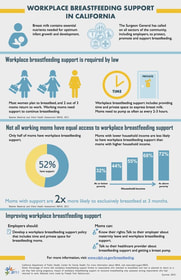Prenatal and Postpartum Care
Workplace Resources for Family Leave and LactationEmployee rights, Family Leave, and Disability information

Paid Family Leave provides benefits to new parents who need time to bond with a new child entering their life either by birth, adoption, or foster care placement. Both mothers and fathers are eligible. To learn more about eligibility and to calculate benefits, go to: edd.ca.gov/Disability/paid_family_leave.htm
Pregnant mothers may also qualify for Disability Insurance during their pregnancy. For more information on eligibility and benefits, go to: www.edd.ca.gov/Disability/Disability_Insurance.htm Lactation resources Click above to view the useful infographic about workplace breastfeeding. Click above to view the useful infographic about workplace breastfeeding.
Workplace breastfeeding support is required by law. This means that nursing mothers have sufficient break time and access to a private space - not a bathroom - to pump. Workplace breastfeeding support includes providing time and private space to express breast milk. Moms need to pump as often as every 2-3 hours. Women can also take Paid Family Leave in California to have more time to bond with their baby and breastfeed.
Breastfeeding Warmlines Telephone assistance (English and Spanish) for breastfeeding questions: www.centralcoastbreastfeeding.com/telephone-support Central Coast Breastfeeding Coalition For the current status of lactation services in SLO County, go to: www.centralcoastbreastfeeding.com Resources for Pregnant and New ParentsSLO County Perinatal Provider Resource List
Support lines, mental health, support groups, counseling, classes and more for pregnant and new parents and young children. https://pmadslo.org/find-help-now-resources Central Coast Childbirth Network The Network supports childbirth professionals, parents, and families in San Luis Obispo County, and Santa Maria Valley from preconception through the first year of parenting. https://www.centralcoastchildbirthnetwork.com/ First 5 SLO County First 5 SLO County has free Kits for New Parents. Call 805-781-4058 to request a kit. |
Need Help?
Contact an advocate or staff member at a Family Resource Center for support with non-medical needs such as food, clothing, shelter, parent education and navigating social services. A full listing of Family Resource Centers in San Luis Obispo County can be found here:
https://sloparents.org/slo-frc-directory/ Reproductive Health Care for Parents
CAPSLO's Center for Health & Prevention has clinic locations in San Luis Obispo and Arroyo Grande where adults can obtain free, confidential reproductive health care. Providers speak Spanish and walk-ins are accepted.
Planned Parenthood provides confidential reproductive health care in San Luis Obispo and Santa Maria with no- and low-cost fees. San Luis Obispo Public Health Department has reproductive health care services available in 2 locations: Paso Robles and San Luis Obispo. For appointments and contact information: www.slocounty.ca.gov/Departments/Health-Agency/Public-Health/Clinic-Locations.aspx. |
Pregnancy & Parenting Support of SLO County (PPS)
PPS is a perinatal resource center, providing resources for families specific to the needs of pregnancy and early childhood such as maternity and baby clothes, diapers, wipes, formula and baby food, nursing supplies, baby equipment (including safe sleep items) and new car seats.
PPS provides local families with emotional support, practical assistance, and connections to community resources from pregnancy through age 5. Staff are certified car seat technicians and instruct clients on how to properly install car seats and safely position their children.
Emotional support and access to therapy is provided through the Postpartum Depression Warmline (805) 541-3367 and in-person appointments. PPS provides referrals to medical and mental health providers, lactation and parenting consultants, and housing and basic needs assistance.
WIC
WIC (Women, Infants, and Children) is a federally-funded health and nutrition program for low to medium-income women who are pregnant or have a child under five years of age. The SLO County WIC program provides coupons for free healthy, nutrient-rich foods; nutrition and breastfeeding education; and referrals to health care and other social services. WIC staff provide dental health education and a dentist conducts oral screenings for children and applies fluoride varnishes.
WIC offers extensive breastfeeding education and support, including:
PPS is a perinatal resource center, providing resources for families specific to the needs of pregnancy and early childhood such as maternity and baby clothes, diapers, wipes, formula and baby food, nursing supplies, baby equipment (including safe sleep items) and new car seats.
PPS provides local families with emotional support, practical assistance, and connections to community resources from pregnancy through age 5. Staff are certified car seat technicians and instruct clients on how to properly install car seats and safely position their children.
Emotional support and access to therapy is provided through the Postpartum Depression Warmline (805) 541-3367 and in-person appointments. PPS provides referrals to medical and mental health providers, lactation and parenting consultants, and housing and basic needs assistance.
- All of the services provided by PPS are free of charge and available for ALL families within SLO County.
- Services are available in English and Spanish.
- All services are by appointment only (Monday through Friday, 8am to 3pm) at 3480 South Higuera, Suite 100, San Luis Obispo.
- Families can call (805) 541-3367 to schedule with bilingual, bi-cultural staff.
WIC
WIC (Women, Infants, and Children) is a federally-funded health and nutrition program for low to medium-income women who are pregnant or have a child under five years of age. The SLO County WIC program provides coupons for free healthy, nutrient-rich foods; nutrition and breastfeeding education; and referrals to health care and other social services. WIC staff provide dental health education and a dentist conducts oral screenings for children and applies fluoride varnishes.
WIC offers extensive breastfeeding education and support, including:
- A comprehensive breastfeeding class for pregnant women and their partners.
- An electric breast pump loan program for women who will be separated from their babies due to work or school. Women can receive one of these high-quality pumps for up to one year at no cost.
- A Breastfeeding Peer Counseling program. The Peer Counselors are WIC staff with specialized training. They provide women with very frequent individualized support for up to 6 months postpartum.
Specialized Support for At-Risk Pregnancy and Early Childhood
If you're working with an expectant mom who has limited access to resources, is in a high stress environment and/or may have a prenatally substance exposed infant consider referring her to one of the programs below.
The Nurse Family Partnership program helps first time parents of newborns learn positive parenting skills, practice healthy behaviors and assist families in setting future goals. It provides in-home services countywide to eligible mothers, fathers, family members or friends involved in the care of the child and includes specialized assistance with low-birth weight and failure to thrive babies, difficult parent/child relations, tobacco/drug/alcohol exposure to mother or baby, and possible birth defects. Nurse Family Partnership serves low-income, at-risk families. Expectant moms need to enroll by their 28th week of pregnancy. For more information call (805) 781-2068 or visit www.slocounty.ca.gov/Departments/Health-Agency/Public-Health/All-Public-Health-Services/Nurse-Home-Visiting.aspx
Healthy Families America (HFA) is an evidenced-based program for pregnant women and infants. Eligible expectant moms can enroll anytime during any pregnancy. The program supports the family until the child turns 3 years old. Referrals from CWS are accepted in reunification cases with children age birth to 2 years old. Services will continue until the child is 3 years old. To learn more about accessing the program through SLO County Public Health, call (805) 781-2068.
The Nurse Family Partnership program helps first time parents of newborns learn positive parenting skills, practice healthy behaviors and assist families in setting future goals. It provides in-home services countywide to eligible mothers, fathers, family members or friends involved in the care of the child and includes specialized assistance with low-birth weight and failure to thrive babies, difficult parent/child relations, tobacco/drug/alcohol exposure to mother or baby, and possible birth defects. Nurse Family Partnership serves low-income, at-risk families. Expectant moms need to enroll by their 28th week of pregnancy. For more information call (805) 781-2068 or visit www.slocounty.ca.gov/Departments/Health-Agency/Public-Health/All-Public-Health-Services/Nurse-Home-Visiting.aspx
Healthy Families America (HFA) is an evidenced-based program for pregnant women and infants. Eligible expectant moms can enroll anytime during any pregnancy. The program supports the family until the child turns 3 years old. Referrals from CWS are accepted in reunification cases with children age birth to 2 years old. Services will continue until the child is 3 years old. To learn more about accessing the program through SLO County Public Health, call (805) 781-2068.
Support for Perinatal Mood and Anxiety Disorders
The term Perinatal refers to the time frame from pregnancy throughout the first year after the birth of a baby. Perinatal Mood and Anxiety Disorders (PMADs) are a set of disorders that can develop any time during pregnancy or the postpartum period. They include depression, anxiety, panic, obsessive compulsive disorder, post-traumatic stress disorder and postpartum psychosis. Learn more about PMAD symptoms, disorders and treatment at https://pmadslo.org/
The SLO County Postpartum Depression Support Line, 805-541-3367, is a referral for:
Mental Health Services:
If a mom needs immediate mental health services a request can be made through Pregnancy & Parenting Support (PPS). Low to no cost counseling is provided in partnership with Community Counseling Center. Clinicians are trained by Postpartum Support International (PSI) and this program makes every effort to promptly schedule an intake with the referred clients. Case management is provided by PPS staff to complement the mental health services. Call 805-541-3367 to request a mental health intake for a pregnant, postpartum or parenting woman.
Additional Local Telephone Resources:
SLO County Postpartum Support International (PSI) Coordinator: 1-805-994-0873
SLO Hotline and Information Line: 1-800-783-0607
It is important to support mothers in reaching out for help as soon as possible so they can get the help they need and deserve.
The SLO County Postpartum Depression Support Line, 805-541-3367, is a referral for:
- Pregnant, postpartum or parenting women who are struggling and have questions
- Partners, spouses, family members and friends who are concerned for a mom's well being
- Families with infants who need support and resources
Mental Health Services:
If a mom needs immediate mental health services a request can be made through Pregnancy & Parenting Support (PPS). Low to no cost counseling is provided in partnership with Community Counseling Center. Clinicians are trained by Postpartum Support International (PSI) and this program makes every effort to promptly schedule an intake with the referred clients. Case management is provided by PPS staff to complement the mental health services. Call 805-541-3367 to request a mental health intake for a pregnant, postpartum or parenting woman.
Additional Local Telephone Resources:
SLO County Postpartum Support International (PSI) Coordinator: 1-805-994-0873
SLO Hotline and Information Line: 1-800-783-0607
It is important to support mothers in reaching out for help as soon as possible so they can get the help they need and deserve.